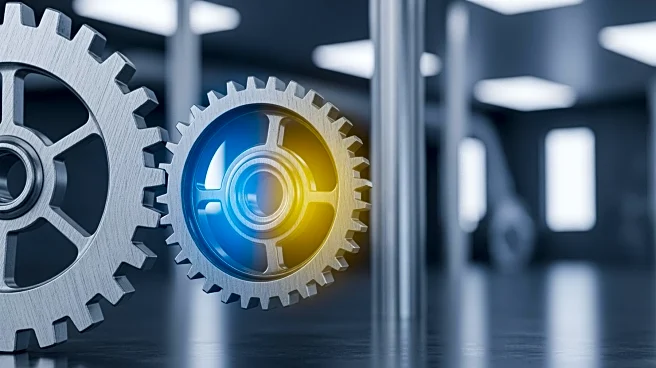What's Happening?
The European Union has voted to deepen its defense industry integration with Ukraine, approving a 1.5-billion euro program aimed at bolstering Ukraine's military capabilities. This decision comes as the
U.S. peace plan remains uncertain and Russia's unconventional warfare continues to challenge the EU. The program includes 300 million euros specifically for the Ukraine Support Instrument, which is intended to enhance Ukraine's defense industry. EU Defense Commissioner Andrius Kubilius emphasized the importance of Ukrainian defense innovations for the EU, stating that the partnership will help build a resilient and sovereign Europe. The EU's defense spending is projected to reach 392 billion euros this year, nearly double the amount from four years ago, reflecting the bloc's heightened security posture in response to Russia's invasion of Ukraine.
Why It's Important?
The EU's decision to strengthen defense ties with Ukraine is significant as it marks a shift in the bloc's approach to security and defense, moving from a primarily economic union to a more militarized entity. This move is expected to enhance the EU's geopolitical power and industrial independence, reducing reliance on external suppliers for military equipment. By integrating Ukrainian military innovations, the EU aims to bolster its defense capabilities and protect its democracies autonomously. The increased defense spending and focus on domestic production could lead to economic growth within the EU's defense sector, providing financial incentives for EU-based defense companies. This development also signals a strategic alignment with Ukraine, potentially influencing the broader geopolitical landscape in Europe.
What's Next?
The EU plans to propose an increase in its long-term budget for defense and space, aiming for 131 billion euros over the next decade. This budget boost is part of a broader strategy to simplify and unify regulations within the EU's defense industry, encouraging investment in domestic production of military equipment. EU member countries are being urged to prioritize purchasing military equipment from within the bloc, with financial incentives to support European defense projects. Ukrainian companies will be allowed to participate in these projects, injecting their military innovations into the EU's defense industry. The EU's defense package also includes measures to deploy tanks and troops more rapidly across Europe, enhancing the bloc's readiness to respond to potential threats.
Beyond the Headlines
The EU's decision to deepen defense ties with Ukraine reflects a broader trend of increasing militarization within the bloc, driven by the ongoing conflict with Russia. This shift raises ethical and legal questions about the EU's role in global security and its commitment to peace. The integration of Ukrainian defense innovations into the EU's military industrial complex could lead to long-term changes in the bloc's defense strategy, potentially influencing its relationships with other global powers. Additionally, the focus on domestic production and industrial independence may impact the EU's economic policies, as it seeks to balance security needs with economic growth.









